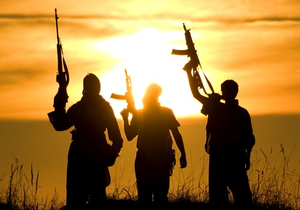Revival by proxy: Islamic State taps Indian Mujahideen's infrastructure to expand in India
By IANS | Updated: October 10, 2025 12:55 IST2025-10-10T12:53:48+5:302025-10-10T12:55:09+5:30
New Delhi, Oct 10 While the Indian agencies continue to keep a close watch on its now defunct ...

Revival by proxy: Islamic State taps Indian Mujahideen's infrastructure to expand in India
New Delhi, Oct 10 While the Indian agencies continue to keep a close watch on its now defunct modules to prevent a resurgence, fresh inputs coming in suggest that the Islamic State is using the networks of the Indian Mujahideen to strengthen its cause in the country.
When the Indian Mujahideen fell, some of its members joined the Islamic State in Syria. One such key member was Shafi Armar, who left to Syria and oversaw the India operations.
More proof of the Islamic State using the network of the Indian Mujahideen was revealed during a raid conducted by the Maharashtra Anti-Terrorism Squad (ATS) and the Pune Police in the Pune Islamic State case.
The raids learnt that the Islamic State members were using an Indian Mujahideen facility to further their activities. This came to light when raids were conducted at the Ashoka Mews Society in Kondhwa. This facility was a hub for the Indian Mujahideen when the outfit was active. This was the same place where the agencies bust a control room of the Indian Mujahideen in 2008. An Intelligence Bureau official said that the Indian Mujahideen remained very active between 2008 and 2012.
However, towards the end of 2012 its activities began to wane for multiple reasons. Yasin Bhatkal had a rift with the ISI as he felt that he and his boys were left to do the dirty job, while the founders Riyaz and Iqbal Bhatkal lived plush lives in Karachi. This led to a falling out and the outfit was never the same since then. This was the time that the Islamic State was rising in Syria and Iraq and the propaganda that the group spread attracted many to believe that the formation of a Caliphate was indeed possible.
While Yasin Bhatkal and his many aides were arrested, other top leaders such as Shafi Armar slipped into Syria. Since Armar took charge many Indian Mujahideen members have embraced the ideology of the Islamic State with an aim of setting up a Caliphate in India. This shift meant that the Islamic State would be using the network of the Indian Mujahideen.
The Islamic State, which has members from all across the country relied heavily on the infrastructure and network of the Indian Mujahideen to further its cause.
Officials say that, while the Islamic State relies on the network of the Indian Mujahideen, there also appears to be some kind of a strategy that is aimed at confusing the agencies. It is confirmed that the Indian Mujahideen as a terror group does not exist. However, all its remaining members are part of the Islamic State.
The confusion stems from the fact that in August this year, the Indian Mujahideen issued a seven minute statement post the eviction drive that was carried out in Assam.
The group called on its supporters to resist the Indian state and called the evictions an attack of specific communities.
An analysis of this statement by the Intelligence agencies said that that this was the work of either the Islamic State or Harkat-ul-Jihadi Islami (HuJI), which works closely with the Islamic State in the northeast.
Such a statement would send the agencies on a chase to find out more about the Indian Mujahideen, while the heat would be lowered on the Islamic State of HuJI.
The agencies say that the Indian Mujahideen is not trying to revive itself. It is now part of the Islamic State and its members would work closely with the allies of the outfit such as the HuJI.
The raids in connection with the Pune Islamic State module is just a tip of the ice-berg. The agencies are confident that further raids and investigations would lead to revealing how invested the former Indian Mujahideen members are in the Islamic State in India.
Disclaimer: This post has been auto-published from an agency feed without any modifications to the text and has not been reviewed by an editor
Open in app